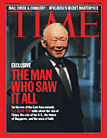 Snippets from TIME's interview with Lee Kuan Yew recently:
Snippets from TIME's interview with Lee Kuan Yew recently:
TIME: U.S. President George W. Bush speaks very openly and genuinely about his religious values. How do you find that?
LEE: I had this argument with a European leader, who said to me, "We Europeans don't like [Bush's] telephone line to God." And I said to him: But when you are fighting a fanatic on the other side who believes he represents God, it does help to give you a serenity and a tranquility of mind to believe you also have God on your side. Look at the President when he announced that he had ordered an attack on Baghdad. I never saw a man more composed—[he] spoke briefly into the microphone and walked away straight-backed, not a doubt in his mind. I thought to myself, that's not a bad commander.
TIME: Do you think of yourself as a religious man? Do you have a religious faith that keeps you going, sustains you?
LEE: We do psychometric tests on our candidates for important jobs. There is a scale of values: social, aesthetic, economic, religious, etc., six values. I cannot judge myself, but I believe I would not score very highly on religious value. I do not believe that prayer can cure, but that prayer may comfort and help. At the same time, I've seen my closest friend [former Finance Minister] Hon Sui Sen on his deathbed; he had had a heart attack and was fighting for his life, doctors were there, the priest was there, but there was no fear in his eyes. He and his wife were devout Catholics. They were both convinced they would meet again in the hereafter. I believe a man or a woman who has deep faith in God has an enormous strength facing crises, an advantage in life.
Many years ago I read a book—The Real Enemy by Pierre d'Harcourt, a French Catholic. He recounted his experience in a Nazi concentration camp. There were two groups of people in his camp. Those with convictions survived, and those who had no deep convictions died. The two groups who had convictions were the deeply religious—of whom he, a Catholic, was one—and the communists. They had the same unshakeable conviction that they would triumph. The others—famous doctors, talented musicians and so on—they would trade their food for cigarettes, knowing that if they did that, one morning they would not be able to go out into the cold for the roll call. But they had given up. The communists and the deeply religious fought on and survived. There are some things in the human spirit that are beyond reason.
Res ipsa loquitur.
 Snippets from TIME's interview with Lee Kuan Yew recently:
Snippets from TIME's interview with Lee Kuan Yew recently: Snippets from TIME's interview with Lee Kuan Yew recently:
Snippets from TIME's interview with Lee Kuan Yew recently:
0 Comments:
Post a Comment
Subscribe to Post Comments [Atom]
<< Home